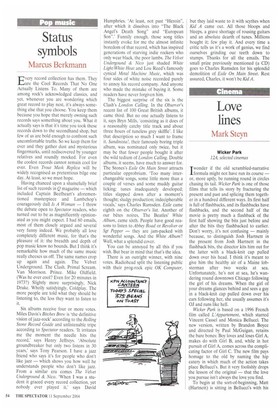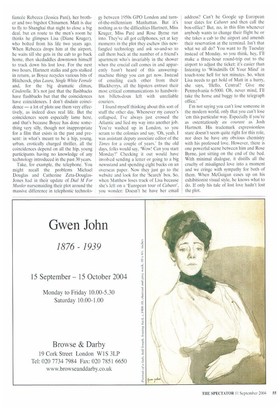Love lines
Mark Steyn
Wicker Park 12A, selected cinemas
Iwonder if the old scrambled-narrative formula might not have run its course — or, more aptly, be running round in circles chasing its tail. Wicker Park is one of those films that tells its story by fracturing the present and past and splicing them together in a hundred different ways. Its first half is full of flashbacks, and its flashbacks have flashbacks, and the second half of the movie is pretty much a flashback of the first half showing the bits just before and after the bits they flashbacked to earlier. Don't worry, it's not confusing — mainly because, to distinguish Josh Hartnett in the present from Josh Hartnett in the flashback bits, the director kits him out for the latter with a black-knit cap pulled down over his head. I think it's meant to give him the healthy air of a Maine lobsterman after two weeks at sea. Unfortunately, he's not at sea, he's wandering round downtown Chicago following the girl of his dreams. When the girl of your dreams glances behind and sees a guy in a black-knit cap pulled down over his ears following her, she usually assumes it's OJ and runs like hell.
Wicker Park is based on a 1996 French film called L'Appartement, which starred Vincent Cassel and Monica Bellucci. The new version, written by Brandon Boyce and directed by Paul McGuigan, retains the bare bones: Boy loves and loses Girl A, makes do with Girl B, and, while in hot pursuit of Girl A, comes across the complicating factor of Girl C. The new film pays homage to the old by naming the hip eatery in which much of the action takes place Bellucci's. But it very foolishly drops the lesson of the original — that the love you pursue isn't always the love you find.
To begin at the sort-of-beginning, Matt (Hartnett) is sitting in Bellucci's with his fiancée Rebecca (Jessica Pare), her brother and two bigshot Chinamen. Matt is due to fly to Shanghai that night to close a big deal, but en route to the men's room he thinks he glimpses Lisa (Diane Kruger), who bolted from his life two years ago. When Rebecca drops him at the airport, he waits till she gets in the cab to go back home, then skedaddles downtown himself to track down his lost love. For the next two hours, Hartnett stalks and gets stalked in return, as Boyce recycles various bits of Hitchcock, plus Laura, Single White Female and, for the big dramatic climax, Cinderella. It's not just that the flashbacks have flashbacks but that the coincidences have coincidences. I don't disdain coincidence — a lot of plots use them very effectively, as indeed does real life. But the coincidences seem especially lame here, and that's because Boyce has done something very silly, though not inappropriate for a film that exists in the past and present: in what's meant to be a hip, young, urban, erotically charged thriller, all the coincidences depend on all the hip, young participants having no knowledge of any technology introduced in the past 30 years.
Take, for example, the telephone. You might recall the problems Michael Douglas and Catherine Zeta-DouglasJones had in their update of Dial M For Murder nursemaiding their plot around the massive difference in telephonic technolo
gy between 1950s GPO London and turnof-the-millennium Manhattan, But it's nothing as to the difficulties Hartnett, Miss Kruger, Miss Pare and Rose Byrne run into. They've all got cellphones, yet at key moments in the plot they eschew this newfangled technology and ask so-and-so to call them back at the number of a friend's apartment who's invariably in the shower when the crucial call comes in and apparently hasn't heard of this answeringmachine thing you can get now. Instead of emailing each other from their Blackberrys, all the hipsters entrust their most critical communications to handwritten billets-doux left with unreliable couriers.
I found myself thinking about this sort of stuff the other day. Whenever my career's collapsed, I've always just crossed the Atlantic and lied my way into another job. You're washed up in London, so you scram to the colonies and say, 'Oh, yeah. I was assistant deputy associate editor of the Times for a couple of years.' In the old days, folks would say, 'Wow! Can you start Monday?' Checking it out would have involved sending a letter or going to a big newsstand and spending eight bucks on an overseas paper. Now they just go to the website and look for the 'Search' box, So, when Matthew loses track of Lisa because she's left on a 'European tour of Cabaret', you wonder: Doesn't he have her email address? Can't he Google up European tour dates for Cabaret and then call the box-office? But, no, in this film whenever anybody wants to change their flight he or she takes a cab to the airport and amends their reservation at the terminal. Isn't that what we all do? You want to fly Tuesday instead of Monday, so you think, hey, I'll make a three-hour round-trip out to the airport to adjust the ticket; it's easier than listening to 'Windmills Of Your Mind' in touch-tone hell for ten minutes. So, when Lisa needs to get hold of Matt in a hurry, she says, 'Hello, Central? Give me Pennsylvania 6-5000. Oh, never mind, take the horse and buggy to the telegraph office.'
I'm not saying you can't lose someone in the modern world, only that you can't lose 'ern this particular way. Especially if you're as ostentatiously au courant as Josh Hartnett. His trademark expressionless stare doesn't seem quite right for this role, nor does he have any obvious chemistry with his professed love. However, there is one powerful scene between him and Rose Byrne, just sitting on the end of the bed. With minimal dialogue, it distills all the cruelty of misaligned love into a moment and we cringe with sympathy for both of them. When McGuigan eases up on his exhibitionist visual style, he knows what to do. If only his tale of lost love hadn't lost the plot.











































































 Previous page
Previous page